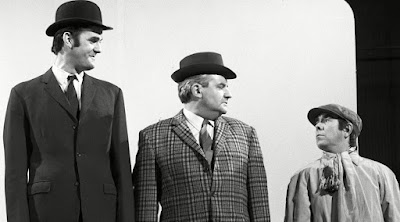 |
| The Frost Report Class sketch. It is heavily copyrighted, but you might get it to play at: https://www.tiktok.com/@freeseedfilms/video/7235691483561544986 |
I found it interesting that, according to his son, Michael Parkinson, who died recently, suffered from imposter syndrome. He doubted his abilities as a writer and television interviewer, and feared he was not as good as others. It seems he could be very short-tempered when an appearance or deadline was near. It is difficult to believe this of someone so accomplished. His son thought it came from having grown up in a council house at Cudworth near Barnsley, the son of a coal miner.
I said I could understand this because I was from a northern working-class background myself, and had often felt above my station. Could I have done more with a bit more self-belief? I don’t know, but I have known and worked with those who reached senior university management, one a Vice Chancellor, and seen what self-regarding mediocrity some can be.
One thing certain to get my wife and family worked up, is when I claim to be working-class. “You are not working-class,” they say. “Your father owned a business, and a house and car. You had books at home. You went to a grammar school and became a university academic.”
I argue back that my father did not own a business until I was in my mid-teens, when he took over from his own father. Until then, his father was his employer and he was treated no differently from other employees. He spent three days a week travelling the country villages, often until after seven at night, with paperwork still to do. One day a week, he cycled to work in a boiler suit to maintain and clean the firm’s cars and vans. He worked a five-and-a-half day week, with two weeks annual holiday. We lived in a working-class area and rented a terraced house until I was six. My mother’s father worked in mills. Most of my friends lived in council or terraced housing, and their fathers worked in factories, on the railways, or on the docks. One drove lorries for the council. Another emptied gas meters. I had no sense of being different, except that we rarely mixed with children from professional families. It was a very working-class grammar school I attended, and did not do very well there. I only went to university late. I looked and sounded working-class. How the headmaster sneered in disbelief when I entered my father’s occupation on my leavers’ form as Company Director. Surely, the circumstances and circles in which you grow up, and how they make you behave, determine your class origins.
We are not going to agree. It is a complex subject that has changed over time. To say someone is working-class now might be seen as an insult. It makes than sound like public lavatory attendants or slaughter men. We all like to think of ourselves as middle-class now.
There is also a North-South element. Social and lifestyle changes occured much earlier in the South of England where my wife grew up. There were more professional jobs, and many people travelled into London each day. My own town had few middle class people, and certainly no upper-class. But it depends how you draw the line. I would say my teachers were working-class, as were bank clerks, and shop and office workers.
The English class system: is it possible to cover all angles of such a vast topic? Sociologists would consider unskilled and semi-skilled employment, white-collar and blue-collar jobs, salaried or waged, sources of income, asset ownership, education, lifestyle, interests and so much more. In some recent categorisations, I come out more like the upper classes.
It doesn’t change my view. Me and Parky: two northern working-class grammar school lads made good. Or am I making excuses and playing the victim?



